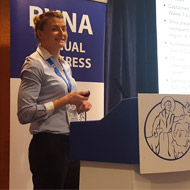
Keynote speaker talks about teamwork and core values
Whether it's a rugby shirt or a nurse's scrubs, you can earn one through sticking by core values, but it's up to you to add your own value.
This was the key message from this year's BVNA Congress keynote speaker, Rachel Taylor, who is both an RVN and captain of the Ladies Welsh Rugby Union team.
She spoke about the core values in her rugby team - respect, discipline, pride and family. But for Rachel, "those kinds of values don't really mean anything unless you stick by them".
"What do rugby and veterinary practice have in common?" she asked, as she switched to a slide showing photos of a veterinary team performing a caesarian section, and another of a rugby team.
The answer is, they both depend on strong team performance; both have a set of core values that team members must buy into; and in both teams, if somebody isn't pulling their weight, the whole thing can fall down.
Once you have earned your shirt, you have to buy into your team's core values, but then you have to add your own to maximise the performance of your team, she explained.
Rachel told delegates of her successes in rugby, but also a time that she found difficult, when she lost her captaincy following the retirement of the coach. During this period she saw a sports chaplain who gave her a cotton band - which she still wears on her wrist today.
He told her to stretch it to test its strength, then to consider the individual fibres. In life, these single strands that represent the whole, making it stronger, could be family, friends, team mates. And this is something that is still important to her today, and something that helps to ground her and remind her of her values.
Even if she is just one thread in her rugby shirt, it's possible to alter its overall strength by being the best she can be - by adding value.
Finally, Rachel said "all you can do is control the controllable". Even if this simply means taking good care of yourself; getting enough sleep and eating well.
"If you can let go of the things that aren't yours to control, and look after yourself, hopefully you can meet your targets," she added.



 The veterinary mental health charity Vetlife is inviting the veterinary community to join it for a sponsored cold-water dip.
The veterinary mental health charity Vetlife is inviting the veterinary community to join it for a sponsored cold-water dip.